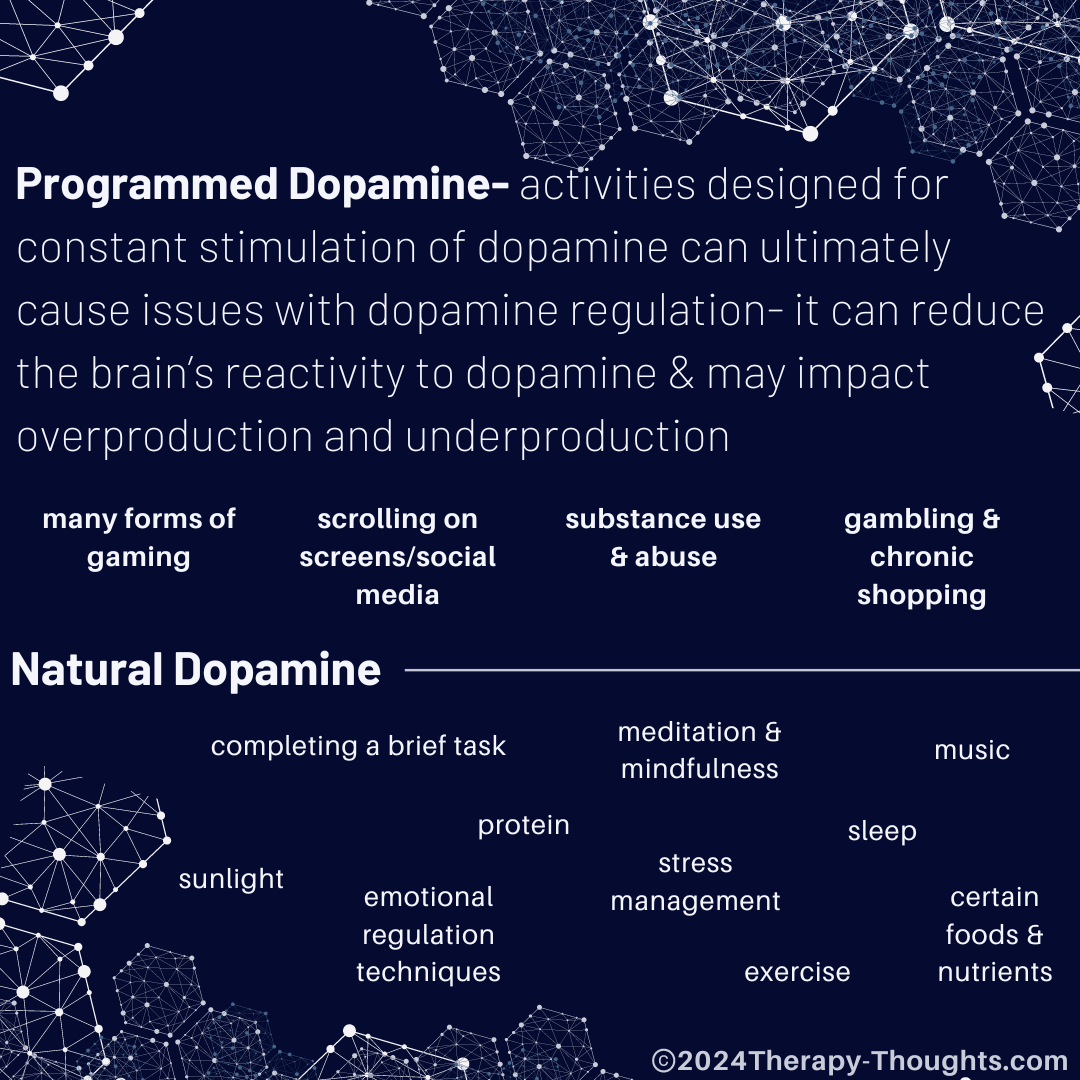Dealing With Dopamine Dysregulation
Dopamine is a current buzz word for a very good reason- it’s greatly impacted by modern technology. This blog focuses on some of those impacts and what you can do to alleviate them for yourself and everyone in your family.
Current Concerns
Dopamine is a neurotransmitter (but also acts as a hormone) that is often known as the “feel good hormone” because it can illicit a feeling of pleasure or instant gratification. When it is released, it can teach our brain to seek out that activity again. When it stops, we can feel a drop in that contentment or motivation. It acts as a reward system and plays a role in mood, attention, memory, and motivation.
Dopamine is naturally motivating, but current research is looking into the long-term impacts on development when it is consistently triggered in young brains for prolonged periods of time due to the increased use of modern technology like tablets, video games, short video clips and reels, apps, scrolling, and even sugary treats- all of which can provide instant and prolonged dopamine releases. These prolonged and constant releases of dopamine can engage addictive brain responses and researchers are looking into whether that constant triggering can increase the risk for future addictive behaviors in adulthood.
Dopamine release can’t and shouldn’t be avoided entirely, of course. Like most things I discuss, it is about balance and being mindful of unnecessary prolonged release and how it may foster dependence on instant gratification. Overstimulation and dependence on dopamine release often presents as behavioral concerns like meltdowns or tantrums in younger children and aggression, impulsivity, poor emotional regulation, irritability, refusals, or being excessively argumentative in older children. It can also lead to anxiety and insomnia.
Constant dopamine stimulation (which I’ll call programmed dopamine) can cause the system to become dysregulated and can reduce the brain’s reactivity to dopamine. If the brain’s system stops registering or producing dopamine in the same way, you can also see negative impacts. Too little dopamine can cause shifts in mood, concentration, cognitive functioning, and motivation.
There are also physical impacts of dopamine dysregulation which can impact the gut biome, gastrointestinal functioning, immune system, muscular system, sleep cycles, and fertility.
How To Address It
The strategies I’ll discuss can work for families by having a family plan that everyone can work together on. They also work for individuals struggling with their own use of programmed dopamine. This can mean using a form of programmed dopamine to “unwind” or numb from daily stress. Using these activities may seem relaxing in the moment because of the sudden release of dopamine, but they ultimately stress the system with constant engagement. Often the forms listed above as programmed dopamine also come with their own residual stressors such as social isolation, withdrawal symptoms, avoidance behaviors, and further impacts on overall mental health.
So what can you do to address dopamine dysregulation? Remember to start in smaller steps so you are more likely to stay consistent. It doesn’t have to be all-or-nothing if you’re afraid you won’t stick with it. Some people do like to start with a detox, though, such as 30 days without certain types of ‘screens’ or highly concentrated sugary treats, and then slowly reintroducing in a more balanced way if they want. Choose what works best for you- it’s about long-term changes that can stick!
Choose any of these ways to start:
Turn conversations about dopamine into a shared family plan to address it and find a better balance
Be the leader- model and guide the wanted behavior changes with compassion
Use humor and teamwork to counteract frustration- ie hit a balloon in the air if frustrated after stopping screens
Increase physical activity- start small
Reduce amount and frequency of high-sugar sweets
Reduce amount of screen time- use device settings, parental controls, and timers for visual cues to keep a shared family plan
Increase natural dopamine options over programmed ones
For programmed dopamine, require a healthy activity or skill before getting it, you can do this as a family too- go for a walk before dessert or before family screen time
Have more outlets and socialization- join social activities, sports, or groups
Prioritize healthy sleep routines
Reduce using screens/apps to combat boredom or to relax

